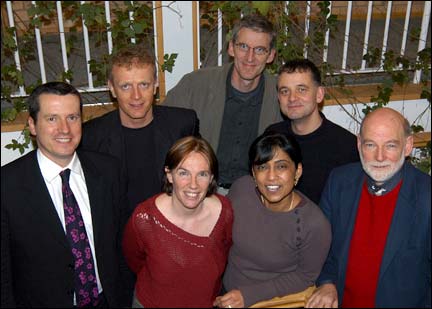|
GEOFF TANSEY WRITER AND CONSULTANT
E-mail: geoff.tansey@jrct.org.uk |
The visionary award
I wrote this account about receiving one of six Joseph Rowntree Charitable Trust 'Visionaries for a Just and Peaceful World' Awards written for Peace Studies News, Issue 39, Autumn 2005. I have been an Honorary Visiting Research Fellow in the Department of Peace Studies in the University of Bradford for some time. I received the award, which provides support for five years, in June 2005 and began working for the Trust in January 2006. My work aims to promote a fair and sustainable food system. That means creating a world in which everyone can feed themselves well, in sustainable ways, and in which the global rules are fairly designed to achieve that. 'It was 18.10 on Tuesday May 16 when the phone rang. I was in Zschortau near Leipzig in Germany, having just finished the first day of a course on law and policy in plant genetic resources I was running. That was when I heard that I had been chosen to be one of the Joseph Rowntree Charitable Trust's Visionaries out of nearly 1600 applicants. Although it sounds a cliché, my jaw literally dropped. 'It is a pretty challenging title to live up to from one of Britain's major, progressive charitable funders. It is their 100th anniversary and the Visionary project is one way they are celebrating it. I didn't sleep much that night. 'I have been working on food, agriculture and development for over 30 years and see important links between our food system, natural resources and creating peaceful societies. Over the past decade or so I became increasingly concerned about the way global rules were being developed, often in remote international bodies far from influence by the people they affect, and what their effects would be on our food future. 'Wherever you are from - laws, rules and conventions matter. They say much about what we value in life. And the rules we live by make a difference to the world we are in. They determine how we treat others, whether we enslave them or not, how we treat the world around us. They can help or hinder us in making a better world. And in large measure we as societies make the rules that govern us up through power plays of different interests. 'Last year the number of hungry people in the world went up for the first time for years. More people suffered from obesity too - in both rich and poor countries. Yet both forms of malnutrition tend to affect the poorest most, wherever they happen to be. They stem in part from a food system that is not delivering what it should, and whose sustainability is questionable. 'Current changes are being driven by a range of major, competing corporate interests, mostly from the rich countries - from the seed to plate. But it is not just rules about food itself that matter - so too do rules about patents, trademarks, plant variety protection and other forms of 'intellectual property rights' - better described as monopoly privileges. Changes to patent laws, for example, underpin the pressures for the rapid commercialisation of the products of genetic engineering and go back to a US Court decision to allow the patenting of micro-organisms in the USA in 1980. 'All countries in or joining the World Trade Organisation - and that means most - must have minimum levels of intellectual property protection whether they like it or not. Most developing countries do not. Pressures to strengthen this protection for the few are felt in various negotiations underway and overshadow others dealing with biodiversity and food security. 'For a more peaceful world we need systems in place to deal with the undoubted problems we can expect with greater climatic fluctuations, and the unexpected consequences of technological changes. That means we need to see better, more just rules and rule making processes that are supportive of the sharing of knowledge, scientific and technical skills about food and developing poor producers livelihoods. 'This is part of a rethink of the meaning of security and the nature of peaceful societies - a crucial element of which is food security for all.' |

